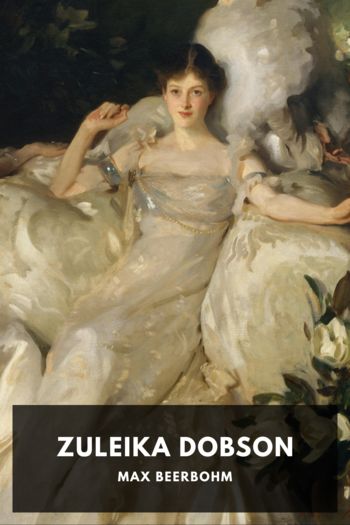Zuleika Dobson - Max Beerbohm (good e books to read txt) 📗

- Author: Max Beerbohm
Book online «Zuleika Dobson - Max Beerbohm (good e books to read txt) 📗». Author Max Beerbohm
He occupied the few minutes of her absence by writing the testimonial. It had shaped itself in his mind as a short ode in Doric Greek. But, for the benefit of Mrs. Batch, he chose to do a rough equivalent in English.
To an Undergraduate Needing Rooms in Oxford
(A Sonnet in Oxfordshire Dialect)
Zeek w’ere thee will in t’Univursity,
Lad, thee’ll not vind nor bread nor bed that matches
Them as thee’ll vind, roight zure, at Mrs. Batch’s …
I do not quote the poem in extenso, because, frankly, I think it was one of his least happily-inspired works. His was not a Muse that could with a good grace doff the grand manner. Also, his command of the Oxfordshire dialect seems to me based less on study than on conjecture. In fact, I do not place the poem higher than among the curiosities of literature. It has extrinsic value, however, as illustrating the Duke’s thoughtfulness for others in the last hours of his life. And to Mrs. Batch the MS., framed and glazed in her hall, is an asset beyond price (witness her recent refusal of Mr. Pierpont Morgan’s sensational bid for it).
This MS. she received together with the Duke’s cheque. The presentation was made some twenty minutes after she had laid her accounts before him.
Lavish in giving large sums of his own accord, he was apt to be circumspect in the matter of small payments. Such is ever the way of opulent men. Nor do I see that we have a right to sneer at them for it. We cannot deny that their existence is a temptation to us. It is in our fallen nature to want to get something out of them; and, as we think in small sums (heaven knows), it is of small sums that they are careful. Absurd to suppose they really care about halfpence. It must, therefore, be about us that they care; and we ought to be grateful to them for the pains they are at to keep us guiltless. I do not suggest that Mrs. Batch had at any point overcharged the Duke; but how was he to know that she had not done so, except by checking the items, as was his wont? The reductions that he made, here and there, did not in all amount to three-and-sixpence. I do not say they were just. But I do say that his motive for making them, and his satisfaction at having made them, were rather beautiful than otherwise.
Having struck an average of Mrs. Batch’s weekly charges, and a similar average of his own reductions, he had a basis on which to reckon his board for the rest of the term. This amount he added to Mrs. Batch’s amended total, plus the full term’s rent, and accordingly drew a cheque on the local bank where he had an account. Mrs. Batch said she would bring up a stamped receipt directly; but this the Duke waived, saying that the cashed cheque itself would be a sufficient receipt. Accordingly, he reduced by one penny the amount written on the cheque. Remembering to initial the correction, he remembered also, with a melancholy smile, that tomorrow the cheque would not be negotiable. Handing it, and the sonnet, to Mrs. Batch, he bade her cash it before the bank closed. “And,” he said, with a glance at his watch, “you have no time to lose. It is a quarter to four.” Only two hours and a quarter before the final races! How quickly the sands were running out!
Mrs. Batch paused on the threshold, wanted to know if she could “help with the packing.” The Duke replied that he was taking nothing with him: his various things would be sent for, packed, and removed, within a few days. No, he did not want her to order a cab. He was going to walk. And “Goodbye, Mrs. Batch,” he said. “For legal reasons with which I won’t burden you, you really must cash that cheque at once.”
He sat down in solitude; and there crept over him a mood of deep depression … Almost two hours and a quarter before the final races! What on earth should he do in the meantime? He seemed to have done all that there was for him to do. His executors would do the rest. He had no farewell-letters to write. He had no friends with whom he was on terms of valediction. There was nothing at all for him to do. He stared blankly out of the window, at the greyness and blackness of the sky. What a day! What a climate! Why did any sane person live in England? He felt positively suicidal.
His dully vagrant eye lighted on the bottle of Cold Mixture. He ought to have dosed himself a full hour ago. Well, he didn’t care.
Had Zuleika noticed the bottle? he idly wondered. Probably not. She would have made some sprightly reference to it before she went.
Since there was nothing to do but sit and think, he wished he could recapture that mood in which at luncheon he had been able to see Zuleika as an object for pity. Never, till today, had he seen things otherwise than they were. Nor had he ever needed to. Never, till last night, had there been in his life anything he needed to forget. That woman! As if it really mattered what she thought of him. He despised himself for wishing to forget she despised him. But the wish was the measure of the need. He eyed





Comments (0)